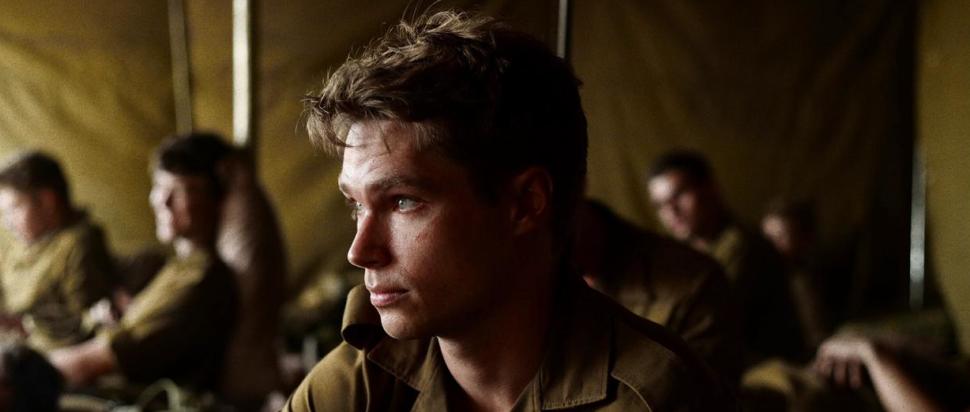Oliver Hermanus on Moffie
South African filmmaker Oliver Hermanus returns with Moffie, an extraordinary drama about a gay teen conscripted to fight in the Angolan war in Apartheid-era South Africa
South African filmmaker Oliver Hermanus is propping up the May Fair bar and sipping on a well-deserved lager after a day of press at the London Film Festival. He’s also having a chuckle to himself after bandying about one of the most hateful words in Afrikaans all afternoon: “moffie”, the title of his new movie. The slur doesn’t have an appropriate equivalent in English, although the subtitlers of the film have gone with “faggot”.
“I don't think there's an English word that has the same level of venom to it,” the 36-year-old filmmaker tells me. “In South Africa, it can be about your sexuality, but ultimately it's got to do with your value as a man in some way. And it really is a weapon.”
Set in 1981, at the height of Apartheid, Hermanus' film is inspired by Andre Carl Van der Merwe’s autobiographical novel of the same name. It follows Nicholas, a gay 19-year-old who’s conscripted to national service, which will involve army training at a pitiless boot camp followed by a stint on the front line of South Africa’s border conflict with communist-backed Angola. Hermanus, who’s black, explains that the brutality of these boot camps wasn’t known to him before reading the novel. “I'm not white, so I wouldn't have done national service. It's the one thing that white South Africans had to do that black and coloured people didn't.’”
In fact, until Hermanus’ producers approached him to adapt Moffie, he hadn’t given the concept that white men could be suffering through Apartheid a second thought. “It wasn't something that I could've ever imagined,” he says. “That's why, even now, when the film comes out in South Africa [in 2020], it'll be interesting to see if there's any space in our society for audiences to empathise with these characters.”
The question of “why tell this particular story?” haunted Harmanus through pre-production until he shifted focus. “I began to realise that, as a society in South Africa, we have a collective sense of trauma and we have a collective repression,” he explains. “It's probably the one thing we have in common among the different races; that's our thread. And maybe this story, in a way, is a more challenging way of demonstrating that.”
Perhaps Hermanus also started to get a handle on the material when he began to personalise it. The director realised he could take certain liberties with the novel after sitting down with its author. “Once I met with [Van der Merwe] I found out the book wasn't fully factual, and once I knew that I felt that I could be playful with it. So there are many things in the movie that are from my personal memory.”
An example he cites is an extraordinary flashback that punctuates the movie. The dreamy scene, which takes the form of a single unbroken shot, takes us back to perhaps eight or nine years earlier, to a sun-dappled public lido, where a younger Nicholas is first called a moffie by an irate middle-aged brute who sees the boy’s eyes linger on a fellow swimmer in the male changing rooms. “That exact thing didn't happen to me, but something like that did. So by the time it got to the script, I'd already infused it with a lot of memories – both mine and other people's.”
It’s hard to imagine the film without this scene, given it gives us context to the past trauma that Nicholas has been repressing, but Hermanus had to fight to keep it. “The producers at one point thought the flashback was out of place; it would be destabilising. But I negotiated with them that I was at least going to shoot it and then we could fight about it in the editing suite.” Hermanus also felt the scene was essential because it gets to the heart of what Moffie is about: shame. “The word is not used just to shame the gay characters,” he explains. “It's used to shame them all. It was about showing how a generation of South African men, who are alive and well today, were coded with something that they passed on to our society.”
This is Hermanus’ second drama centred on a closeted gay character. His intoxicating, deeply disturbing sophomore film Beauty, from 2011, followed a middle-aged businessman who becomes obsessed with a disarmingly handsome young man who’s friends with his college-aged daughter. While Hermanus admits that both films share similar DNA, he doesn’t recognise the younger filmmaker who made Beauty. “I feel like I was an angry filmmaker back then. I made an angry movie about a man who was dangerous and violent. But with this one, my attitude is very different.”
What has changed, we ask.
“I've gotten older or become more emotional, I guess. I think maybe I've also started to think about these things differently and my intention with the audience has changed. Maybe with Beauty, I was trying to shock you and take you hostage in some way. With this one, I think that the desire is totally different: it's softer and more caring about its characters.”
Moffie is released on Curzon Home Cinema
